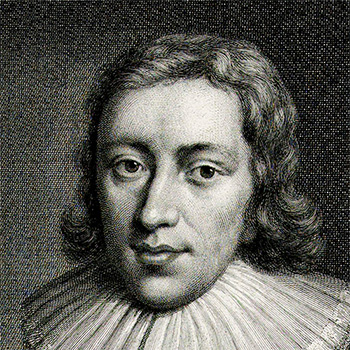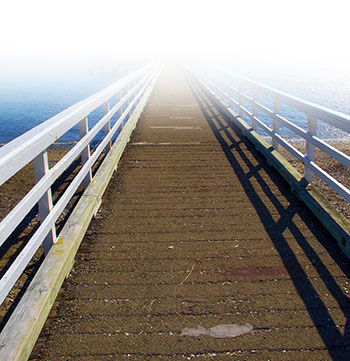Back to series
Poem: Sonnet 19



Poem: Sonnet 19
When I Consider How My Light is Spent
Click here to open a Print-Friendly PDF
When I consider how my light is spent,
Ere half my days, in this dark world and wide,
And that one Talent which is death to hide
Lodged with me useless, though my Soul more bent
To serve therewith my Maker, and present
My true account, lest he returning chide;
“Doth God exact day-labour, light denied?”
I fondly ask. But patience, to prevent
That murmur, soon replies, “God doth not need
Either man’s work or his own gifts; who best
Bear his mild yoke, they serve him best. His state
Is Kingly. Thousands at his bidding speed
And post o’er Land and Ocean without rest:
They also serve who only stand and wait.”


John Milton
PoetJohn Milton, (1608 – 1674) was an English poet, who served as a civil servant for the Commonwealth of England under its Council of State and later under Oliver Cromwell. He wrote at a time of religious flux and political upheaval, and is best known for his epic poem Paradise Lost, written in blank verse. His career as a writer of prose and poetry spans three distinct eras: Stuart England; the Civil War (1642-1648) and Interregnum, including the Commonwealth (1649-1653) and Protectorate (1654-1660); and the Restoration. John Milton died in England in November 1674. There is a monument dedicated to him in Poet’s Corner in Westminster Abbey in London.

 COPYRIGHT: This publication is published by C.S. Lewis Institute; 8001 Braddock Road, Suite 301; Springfield, VA 22151. Portions of the publication may be reproduced for noncommercial, local church or ministry use without prior permission. Electronic copies of the PDF files may be duplicated and transmitted via e-mail for personal and church use. Articles may not be modified without prior written permission of the Institute. For questions, contact the Institute: 703.914.5602 or email us.
COPYRIGHT: This publication is published by C.S. Lewis Institute; 8001 Braddock Road, Suite 301; Springfield, VA 22151. Portions of the publication may be reproduced for noncommercial, local church or ministry use without prior permission. Electronic copies of the PDF files may be duplicated and transmitted via e-mail for personal and church use. Articles may not be modified without prior written permission of the Institute. For questions, contact the Institute: 703.914.5602 or email us.
-
Recent Podcasts
Ralph Waldo Emerson’s Philosophy and Influence
by David George Moore on July 26, 2024Ralph Waldo Emerson was a gifted nineteenth century...Read More
-
The Side B Stories – Nate Sala’s Story
by Jana Harmon, Nate Sala on July 19, 2024
-
Terrorism Through the Eyes of Faith
by Dennis Hollinger on July 12, 2024
-
Recent Publications
Hasn’t Science Proven That Belief in God Is an Outdated Superstition?
by Sharon Dirckx on July 1, 2024Many assume that scientific practice and belief in...Read More
-
Has the Bible Been Corrupted as Some Muslims Claim?
by Andy Bannister on June 1, 2024
-
Seeing Jesus Through the Eyes of Women
by Rebecca McLaughlin on May 15, 2024
0
All Booked
0.00
All Booked
0.00
All Booked
22194
C.S. Lewis’s The Abolition of Man Live Online Small Group 8:00 PM ET
https://www.cslewisinstitute.org/?event=c-s-lewiss-the-abolition-of-man-study-course&event_date=2024-10-02®=1
https://www.paypal.com/cgi-bin/webscr
2024-10-02

Next coming event
Days
Hours
Minutes
Seconds
C.S. Lewis’s The Abolition of Man Live Online Small Group 8:00 PM ET
On October 2, 2024 at 8:00 pmSpeakers

John Milton
Poet
Team Members

John Milton
PoetJohn Milton, (1608 – 1674) was an English poet, who served as a civil servant for the Commonwealth of England under its Council of State and later under Oliver Cromwell. He wrote at a time of religious flux and political upheaval, and is best known for his epic poem Paradise Lost, written in blank verse. His career as a writer of prose and poetry spans three distinct eras: Stuart England; the Civil War (1642-1648) and Interregnum, including the Commonwealth (1649-1653) and Protectorate (1654-1660); and the Restoration. John Milton died in England in November 1674. There is a monument dedicated to him in Poet’s Corner in Westminster Abbey in London.





